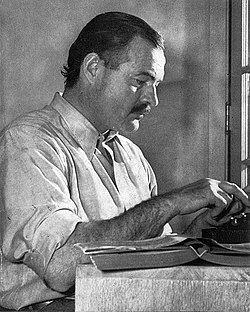 Ernest Hemingway, one of the most famous bearers. | |
| Pronunciation | /ˈɜːrnɪst/ |
|---|---|
| Gender | male |
| Origin | |
| Word/name | Germanic |
| Meaning | earnest, serious, warrior |
| Region of origin | Northern Europe, Central Europe |
| Other names | |
| Related names | Ernie (hypocorism) Ernestine, Erna (female forms) Ernst Ernesto Ernestas Ernő |
Ernest is a given name derived from the Germanic word ernst, meaning "serious", often shortened to Ernie.
Contents
Notable people and fictional characters with the name include: